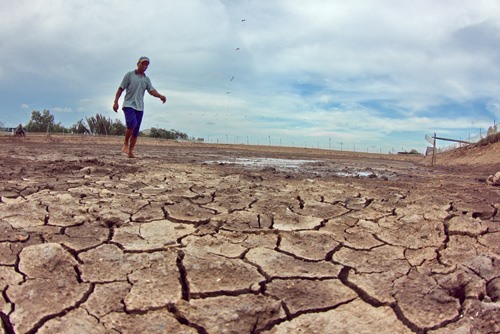 Society
Society

Multilateral, regional and international deals and initiatives to counter global warming must be prioritised and implemented, said Ngô Thị Hòa, ambassador of Việt Nam to the Netherlands, on Thursday.
 |
| Abnormal drought leaves many shrimp-raising ponds in Thạnh Hải Commune in the southern province of Bến Tre dry. Việt Nam is among countries directly affected by climate change. - VNA/VNS Photo Duy Khương |
HÀ NỘI - Multilateral, regional and international deals and initiatives to counter global warming must be prioritised and implemented, said Ngô Thị Hòa, ambassador of Việt Nam to the Netherlands, on Thursday.
Speaking during a round table meeting on climate and security in the Netherlands, she stated that as a country that is directly affected by climate change, Việt Nam has actively contributed to programmes and action plans to tackle the issue.
Việt Nam will subsequently host an Asia-Europe meeting to jointly respond to climate change and achieve their sustainable development goals in the middle of 2018, to raise awareness and call for international co-operation and policy sharing between the Netherlands, the European Union, and Asian countries suffering from the effects of climate change.
The annual roundtable meeting, hosted by the Delft-based IHE Delft Institute for Water Education, attracted the participation of 60 delegates representing foreign diplomatic delegations, the Dutch ministries of Foreign Affairs and Defence, Clingendael Academy, various research institutions and non-governmental organisations, and Dutch and international scholars.
The meeting aims to promote international co-operation and share strategies to address the challenges posed by climate change, including those related to natural resources, food security and migration, as well as the international response to climate change and the stability of countries that are vulnerable to global warming.
The meeting saw the participation of various countries and provided them with the opportunity to co-operate, maintain peace and strengthen the engagement of international agreements and initiatives.
While addressing the event, Professor Eddy Moors, rector of the IHE Delft Institute for Water Education, said that climate and security are closely interrelated, and all countries require regional and international approaches to face its challenges.
He added that it is necessary to place the issues of climate and security on international agendas, so every nation and all individuals can have a better understanding and plan effective action to solve the problem.
Other speakers from Clingendael Academy and the IHE Delft Institute also highlighted the relationship between climate change and cross-border migration with security in countries that are prone to rising sea levels, such as Bangladesh and Chad, as well as the issue of water scarcity and the potential solutions to remove salt in seawater and provide fresh water, to maintain stability in drought-hit areas.
They also discussed the role of water diplomacy in countries that share border on rivers, as well as conflicts caused by competition for water resources, and the necessity of promoting the international efforts to protect fauna and enhance the sustainability of nature reserves.
Michel van Winden, representative of the Dutch Ministry of Foreign Affairs, said that the Netherlands has attached great importance to its response to climate change and is ready to co-operate with other countries on this issue.
As a non-permanent member of the United Nations Security Council since 2018, the Netherlands will include the issues of climate and security on the UN’s agenda, to promote international co-operation in this area, Winden added.
The participants were informed that the 23rd UN Climate Change Conference will take place in Germany in November while the Dutch Ministry of Foreign Affairs will organise the Planetary Security Conference at the Hague in December. – VNS




